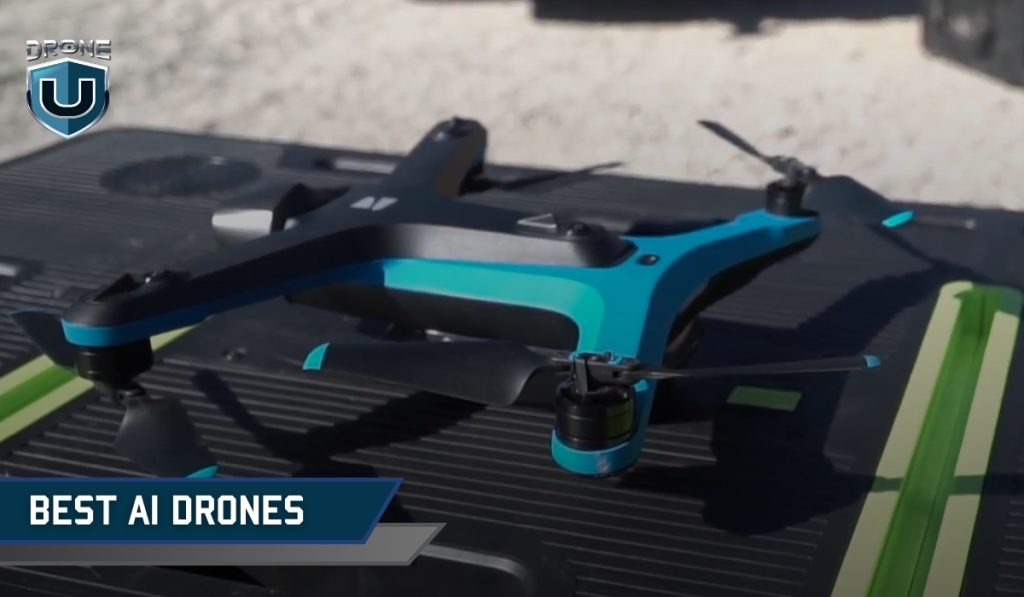
Picture this: An unmanned aircraft is automatically navigating a dense forest, dodging branches, and snapping breathtaking aerial photos.
Does that seem like a scene from a sci-fi movie?
Well, not anymore. This is now a reality with AI drones.
These intelligent machines transform how we explore our world and capture aerial data.
Drones have already changed the way we capture moments, explore new places, and gather data. But in 2025, AI-powered drones took it even further. These autonomous birds offer smarter navigation, better obstacle avoidance, and features that make flying easier than ever.
The AI drone market has rapidly expanded, offering specialized solutions for diverse professional and recreational applications.
With so many choices, how do you pick the right one? That’s where we come in.
Let’s dive in!
What are AI Drones?
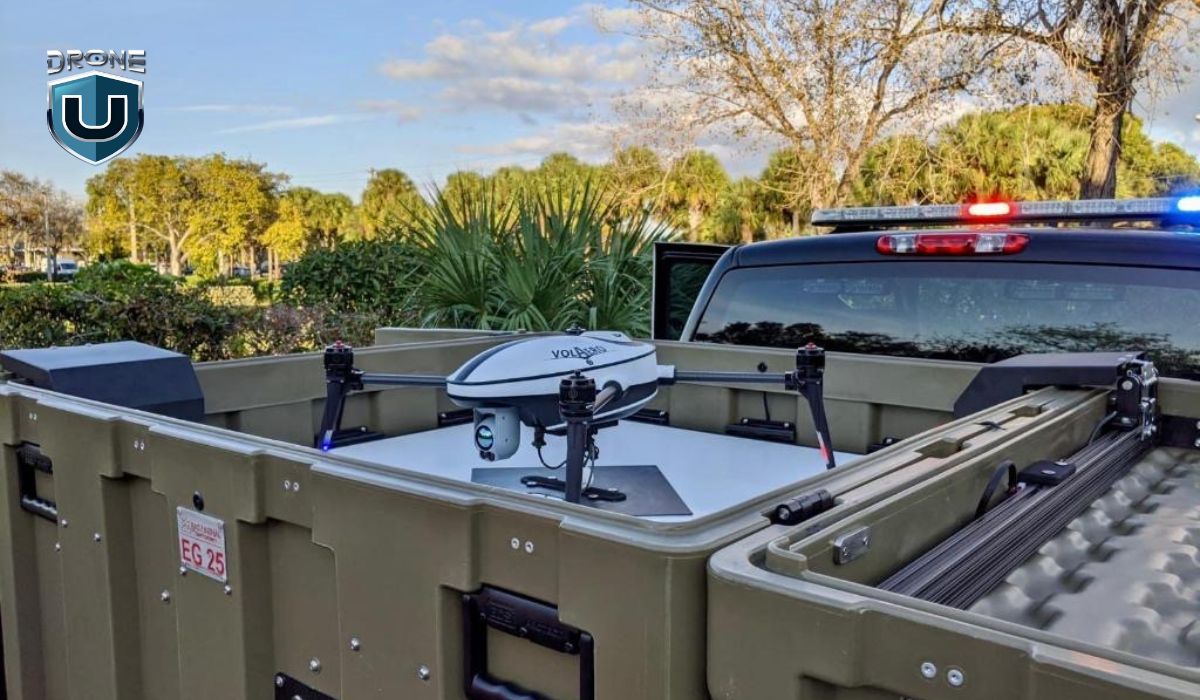
AI drones are unmanned aircraft that use artificial intelligence to fly autonomously and make smart decisions. Unlike traditional drones, which require manual control, AI drones have advanced sensors, cameras, and software that allow them to perceive and navigate their environment.
These drones can detect obstacles, plan their flight paths, and even complete tasks without needing constant input from a pilot. These drones leverage advanced algorithms to process environmental data and make autonomous decisions that enhance flight performance and safety.
Some of the standout features and capabilities of AI drones include:
- Obstacle avoidance and collision prevention
- Autonomous navigation and path planning
- Object detection and recognition
- Intelligent task execution (e.g., surveillance, delivery)
- Adaptive flight control and stabilization
- Machine learning-based decision-making
- Environmental awareness and situational analysis
In short, AI drones make flying easier, safer, and more efficient by using advanced technology to handle tasks that once required a human pilot.
Let’s now understand how can you choose a perfect AI drone for yourself.
Criteria for Choosing an AI Drone
We’ve tested a range of drones, and here’s what we considered to help you make the best choice:
1. Flight Time
AI drones often consume more battery due to their advanced features. It’s important to think about how long you need the drone to stay airborne for your desired task.
2. Camera Quality
AI drones excel at capturing incredible visuals, but camera quality varies. Consider resolution, sensor size, and any specialized features like low-light performance or object tracking.
3. Range
Think about the operational area you envision. If you’re working in vast areas, look for a drone with a longer range. If precision is more important, a drone with a shorter, more controlled range may be a better fit.
4. Ease of Use
AI technology can make flying easier, but some drones are more user-friendly than others. Consider your piloting experience and how much assistance you desire.
5. Safety Features
Look for essential features like obstacle avoidance, return-to-home functionality, and automatic landing in case of signal loss. These features are crucial for a safe and stress-free flight experience.
6. Regulations
Drone operators must comply with Federal Aviation Administration (FAA) regulations, which include specific requirements for drone weight, registration, and operational zones. Familiarize yourself with local drone regulations before making a purchase.
The Best AI Drones in the Market
After carefully considering the above factors, here are the top 6 AI drones that meet these criteria:
1. DJI Mavic Air 2S
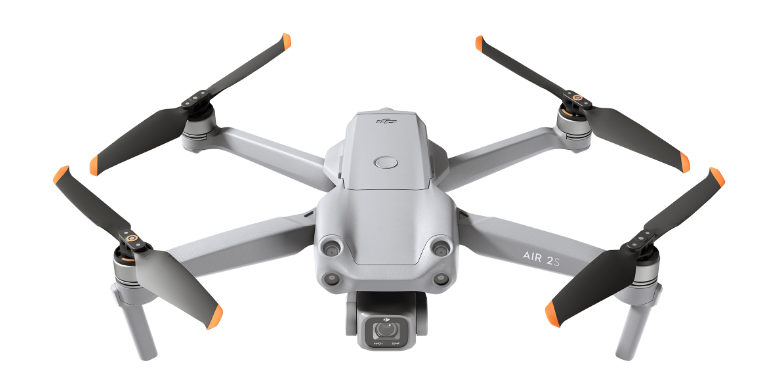 Source: DJI
Source: DJI
A creative powerhouse, the Mavic Air 2S features a 1-inch CMOS sensor capable of capturing breathtaking 5.4K video. Omnidirectional obstacle avoidance sensors keep you flying worry-free, allowing you to focus on capturing stunning aerial masterpieces.
Specifications:
- Sensor: 1-inch CMOS
- Video Resolution: 5.4K
- Max Flight Distance: 18.5 km
- Flight Time: 31 minutes
- Obstacle Avoidance: Omnidirectional sensors
Pros:
- Delivers breathtaking visuals due to the large sensor.
- Allows for capturing a wider range of aerial content.
- Omnidirectional sensors provide a safety net for worry-free flight.
- Ideal for travel and content creators.
Cons:
- Compared to some models, the Mavic Air 2S comes at a higher cost.
- Slightly heavier than the DJI Mini 3 Pro, potentially requiring additional licensing depending on regulations.
2. Autel Robotics EVO II Pro 6K Enterprise Bundle V3
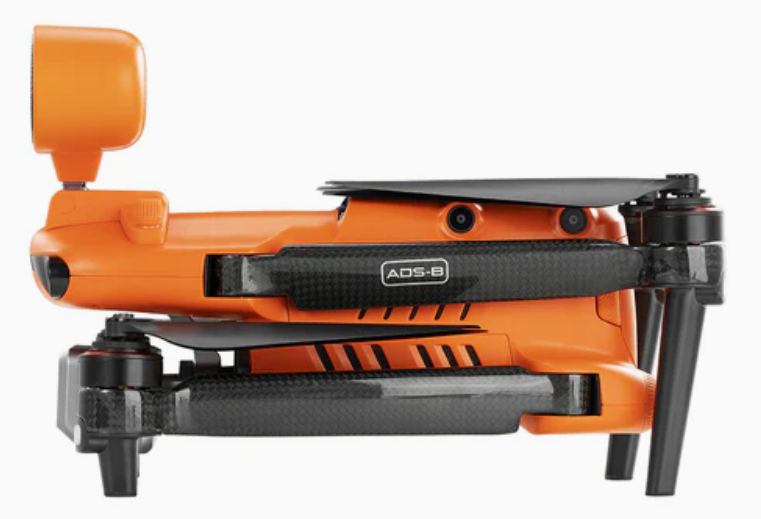 Source: Autel Robotics
Source: Autel Robotics
This EVO II Pro 6K Enterprise Bundle V3 offers multiple models, each boasting impressive AI features. Track your subject with ease or navigate complex environments with the help of automatic obstacle detection. With an EVO II drone, you’ll have the perfect AI companion for any aerial mission.
Specifications:
- 20MP 1″ CMOS sensor capable of 6k Ultra HD Videos
- 3x Lossless 16x Digital Zoom Capability
- 360° obstacle avoidance with 19 groups of sensors
- 7.9″ Smart Controller V3
- Dynamic Track 2.1
- 42 minutes flight time
Pros:
- Multiple models cater to diverse functionalities and needs.
- Extended flight duration allows for capturing more expansive aerial footage.
Cons:
- The cost depends on the chosen model and its advanced features.
- Some models can be bulkier, impacting portability.
3. PowerVision PowerEye
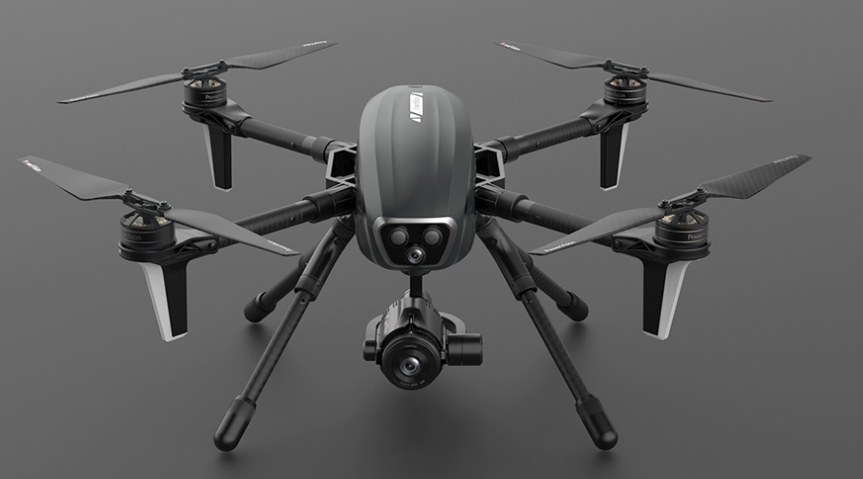 Source: PowerVision
Source: PowerVision
This PowerEye drone stands out for its long flight time and unique tethered flying option, ideal for extended aerial missions and commercial applications.
The PowerEye stands out for its marathon flight times, ideal for extended aerial missions. Add to that the unique tethered flying option, perfect for commercial applications requiring continuous power. The PowerEye is a workhorse in the world of AI drones.
Specifications:
- Sensor: 4/3′ CMOS
- Video Resolution: 4K
- Max Transmission Distance: 5 km
- Flight Time: 29 minutes
- Gimbal: 3-axis
Pros:
- Tethered option enables exceptionally long missions.
- Perfectly suited for tasks requiring continuous power, such as inspections or security.
- Micro Four Thirds sensor delivers solid image capture capabilities.
- Covers vast areas efficiently.
Cons:
- Tethered flight restricts movement in certain scenarios.
- Less portable compared to some options.
4. Skydio X10
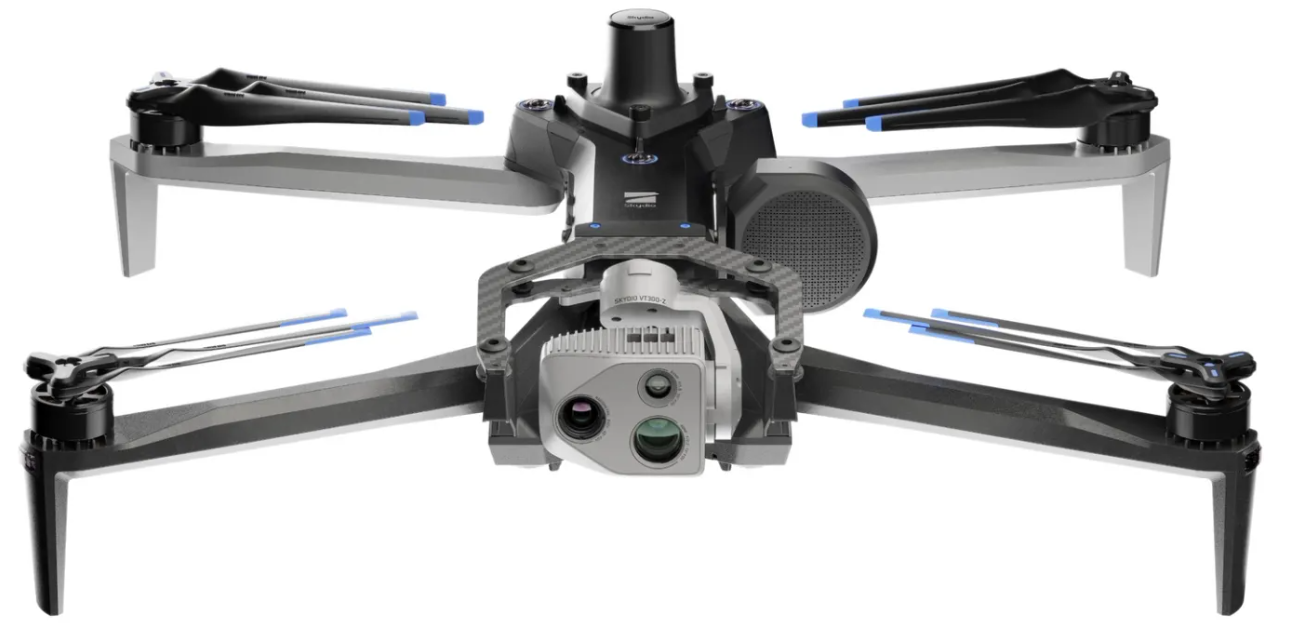 Source: Skydio
Source: Skydio
Known for its ease of use and autonomous flight modes, the Skydio X10 is a great choice for industrial applications or those seeking a user-friendly AI drone experience.
The user-friendly Skydio X10 makes flying a breeze. With intuitive controls and a variety of autonomous flight modes, the Skydio X10 allows you to experience the power of AI without a steep learning curve.
Specifications:
- Sensor: 1/2″ 48MP CMOS
- Video Resolution: 4K
- Range: 5km
- Flight Time: 40 minutes
- Obstacle Avoidance: 360-degree
Pros:
- User-friendly controls and autonomous flight modes make flying effortless.
- Six-rotor design offers a confidence boost for beginners.
- Provides ample time for capturing desired aerial footage.
Cons:
- Sensor size translates to a lower resolution compared to high-end models.
- May not be ideal for covering larger areas.
5. Ryze Tello EDU
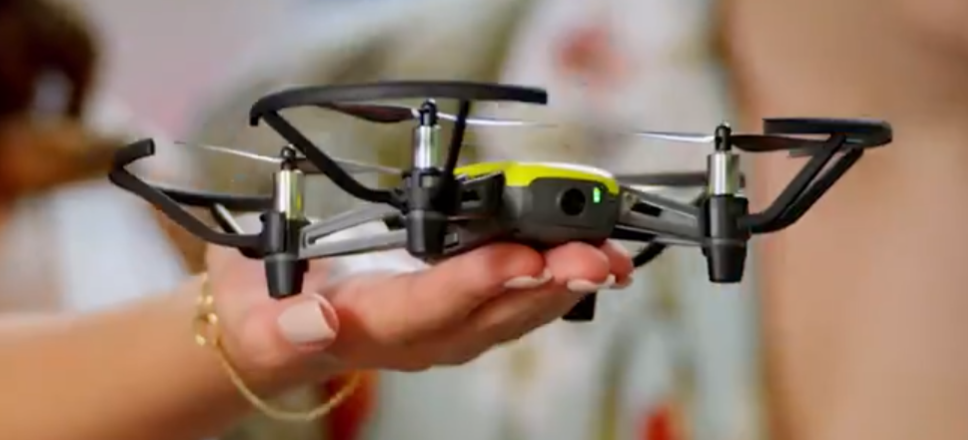 Source: RyzeRobotics
Source: RyzeRobotics
A fantastic option for educators and hobbyists, this budget-friendly drone offers a programmable platform for learning about AI and drone technology.
The Ryze Tello EDU provides an affordable, hands-on platform for STEM education, allowing students and enthusiasts to explore drone programming and AI technologies. This programmable platform allows you to experiment, learn, and unleash your creativity in the sky.
Specifications:
- Camera: 5MP
- Video Resolution: 720p
- Range: 80 meters
- Flight Time: 13 minutes
- Special Feature: Programmable platform
Pros:
- Enables exploration of AI and drone technology at an affordable cost.
- Programmable platform fosters learning and experimentation.
- Compact design allows for easy transport and use.
Cons:
- Primarily suited for learning purposes, not professional photography.
- Not ideal for capturing extensive aerial content.
6. DJI Mini 3 Pro
 Source: DJI
Source: DJI
This lightweight and portable drone packs a punch with its intelligent flight modes, object tracking, and excellent image quality, making it perfect for capturing travel footage or everyday adventures.
Lightweight and portable, the DJI Mini 3 Pro packs a powerful punch. Intelligent flight modes, object tracking, and excellent image quality make it the perfect travel companion for capturing stunning aerial footage of your adventures.
Specifications:
- Sensor: 1/3-inch CMOS
- Video Resolution: 4K
- Range: 18km
- Flight Time: 34 minutes
- Weight: Under 249 grams
Pros:
- Ultra-lightweight design makes it perfect for travel and everyday adventures.
- Captures extensive aerial footage within a compact frame.
- Covers a surprising distance for its size.
- Falls under the 249-gram weight
Cons:
- Image quality may not match higher-end models with larger sensors.
- Due to its lightweight design, strong winds can impact flight stability.
Summary
AI drones aren’t just about the tech. They are about what you can do with it!
The list has explored six compelling AI-powered drones, each with its strengths:
- For a versatile and user-friendly option, the DJI Mavic Air 2S and DJI Mini 3 Pro are excellent choices.
- If you prioritize image quality, the Autel Robotics EVO II Pro 6K stands out.
- For industrial applications or obstacle-heavy environments, the Powervision PowerEye and Skydio X10 excel with their advanced autonomy.
- For those looking to teach or learn about AI drone tech, the Ryze Tello EDU AI is a perfect choice.
Ultimately, the “best” AI drone depends on your specific needs and budget. So, consider what features matter most to you and pick a drone that matches your goals and budget.
Frequently Asked Questions
1. In which industry AI drones are being used?
AI-powered drones are transforming industries by providing advanced data collection, monitoring, and inspection capabilities across agriculture, construction, emergency services, and more. They’re also being explored for delivery services, security, filmmaking, and more.
AI drones are taking off across various industries:
- Agriculture: Monitoring crop health and growth.
- Construction: Inspecting structures and progress.
- Search and Rescue: Locating survivors in disaster zones.
- Delivery Services: Exploring autonomous package delivery.
- Security: Providing aerial surveillance and monitoring.
- Filmmaking: Capturing stunning aerial footage with ease.
2. Which company is making the highest no. of AI drones?
Industry reports often focus on market share by revenue rather than unit volume.
While DJI leads the global drone market, the landscape of AI-enabled drone technology continues to evolve with increasing competition from innovative American and international manufacturers.
Other companies like Autel Robotics, PowerVision, and Skydio are also prominent players in the field.
3. How do AI drones work?
AI drones are essentially regular drones with an extra dose of intelligence. Here’s the gist:
- Sensors: They gather tons of data about their surroundings (cameras, LiDAR).
- AI Processing: This data is analyzed by AI algorithms, allowing the drone to “see” and understand its environment.
- Smarter Decisions: Based on this understanding, the drone can make intelligent choices, like avoiding obstacles or following a subject.
- Easier Flying: AI features can simplify controls and provide real-time data analysis, making flying more intuitive and informative.
AI technologies enable drones to process complex environmental data, make autonomous decisions, and adapt to changing flight conditions with precision.
4. Can AI fly a drone?
AI can also enable drones to perform specific tasks autonomously, like capturing photos or videos, delivering packages, or inspecting infrastructure, based on pre-set parameters.







Add Your Comment